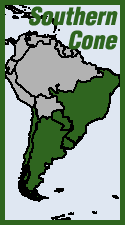 Cheers broke out in the public gallery July 7 as Chile's lower-house Chamber of Deputies voted 68-to-39 with five abstentions to decriminalize cannabis—including a provision for cultivation. The reform of the country's anti-drug statute, Law 20.000, would "depenalize" the possession of up to 10 grams (0.35 ounce) and the growing of up to six plants. The bill makes reference to recreational, medical and spiritual use of the herb. To become law, it still has to be studied by a health committee before the Chamber of Deputies votes again on each specific provision. It will next pass to the senate, and then to the desk of President Michelle Bachelet, who is expected to approve it.
Cheers broke out in the public gallery July 7 as Chile's lower-house Chamber of Deputies voted 68-to-39 with five abstentions to decriminalize cannabis—including a provision for cultivation. The reform of the country's anti-drug statute, Law 20.000, would "depenalize" the possession of up to 10 grams (0.35 ounce) and the growing of up to six plants. The bill makes reference to recreational, medical and spiritual use of the herb. To become law, it still has to be studied by a health committee before the Chamber of Deputies votes again on each specific provision. It will next pass to the senate, and then to the desk of President Michelle Bachelet, who is expected to approve it.
Chile's capital Santiago earlier this year became the site of Latin America's first medical marijuana cultivation project, which raised interest in the decriminalization proposal. After the decrim measure was approved, Communist Party lawmaker Karol Cariola, who is part of Bachelet's leftist coalition, told reporters: "It is a historic day for medicinal users who wish to stop being persecuted, and be able to access a medicine that they can grow in their gardens."
Ana Maria Gazmuri, president of the Daya Foundation, the nonprofit that oversees the medical cultivation project, also expressed enthusiasm about the new measure "We're celebrating the overwhelming approval of this project," she told AP. "This project is on the right path and we're optimistic that it will be passed quickly. It should go through the health commission in a month at most, and ideally it should be approved by the Senate in two months." (More at The Guardian, Emol)
Cross-post to High Times







Comments
Chile begins retail sale of cannabis medicinals